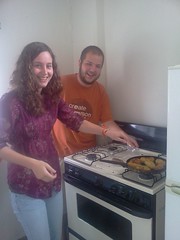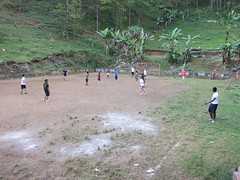 There are many things I have experienced here in Guatemala that I’ll remember for a long time: picking limes off the tree in my backyard, hearing gunshots at night, learning how to salsa dance, the smell of platanos frying in the kitchen, and the satisfaction after understanding a whole conversation in Spanish. But perhaps one of the experiences I’m going to remember the most is the time we got to spend in Coban and the K’ekchi town of San Pedro Carcha these past three days.
There are many things I have experienced here in Guatemala that I’ll remember for a long time: picking limes off the tree in my backyard, hearing gunshots at night, learning how to salsa dance, the smell of platanos frying in the kitchen, and the satisfaction after understanding a whole conversation in Spanish. But perhaps one of the experiences I’m going to remember the most is the time we got to spend in Coban and the K’ekchi town of San Pedro Carcha these past three days.
When arriving after a five hour bus ride from Guatemala City, we quickly realized we were in a very different culture. Women in traditional Mayan dress, one room houses with tin roofs, tortilla stands, stray dogs, and the occasional pig could be seen down every street. The quiet, conservative, and respectful culture was also much different than the loud and affectionate culture we have become accustomed to in the city. The language spoken by most people was K’ekchi, one of the 22 Mayan languages spoken in Guatemala, although most people spoke Spanish as their second language. We learned the word “bontiush”, which means “thank you” in K’ekchi, and used it over and over as we received lots of generosity.
During our time in Coban, we stayed at the Bezaleel Q’eqchi’ Mennonite School, which is a boarding school for students ages 12-22.  Our time at the school was spent playing soccer, squeezing 25 people into a 15 passenger van, taking cold showers, eating lots of beans and tortillas, singing, and spending time with the students. We also attended a K’ekchi Mennonite church service, ate a meal with Mayan families, did some painting for the school, visited a coffee plantation, and met with two long term missionaries working in Coban.
Our time at the school was spent playing soccer, squeezing 25 people into a 15 passenger van, taking cold showers, eating lots of beans and tortillas, singing, and spending time with the students. We also attended a K’ekchi Mennonite church service, ate a meal with Mayan families, did some painting for the school, visited a coffee plantation, and met with two long term missionaries working in Coban.
Although this has been by far the most primitive living situation we’ve had, it was a blessing to experience another culture that exists here in Guatemala. We were welcomed by strangers into a lifestyle totally new to each of us and got to experience a little taste of their daily lives. We’ll carry these interactions and memories with us as we each are challenged to reshape our own worldviews.
– Louise Babikow
Getting back into the groove of speaking Spanish again was a little challenging for many of us at the beginning of this week, but the relaxation that took place in Tikal was much needed. Just three short days of speaking English and lake swimming and our brains were mush (not to be confused with mosh, a Guatemalan oatmeal drink that is served for breakfast), but our spirits were renewed. There was also quite a difference in temperature between Tikal, which is just above sea level, and the capital city, which is well above sea level.
The theme for our outings and lectures has seemed to revolve around human rights this week; a passionate topic for any human being from the beginning of time, and most especially in places where the inequalities are extreme. A lady came to speak to our group about human rights in Guatemala and we visited a forensic anthropologist. Many of the people in Guatemala have roots that run very deep in a sea of pain from the 46 year-long civil war that ended in 1996 with the signing of peace treaties. The war was caused by inequalities, yet most Guatemalans feel that the human rights that have been enacted today protect mostly the ones who have inflicted pain on another as opposed to assisting the one who is in pain. While it is most natural for us, as humans, to have the most empathy for the victim of a human rights violation, we do sometimes appear to overlook the fact that in God’s eyes we are all equal, and that He forgives even the most grievous of sins; therefore so should we. This reminds me of a scripture from the book of John, “…He that is without sin among you, let him first cast a stone…” (John 8:7).
For the weekend, we traveled about 5 hours by bus to Coban, in the state of Alta Verapaz. We stayed at and served a Q’eqchi’ (pronounced key-che) Mennonite school for middle school and high school age children. This school is located in the heart of many beautiful mountains where calla lilies and bananas grow by the side of the road, and they eat the traditional beans and tortillas with every meal. The people speak their indigenous language, some learn Spanish, and a very few learn English.
 On Sunday morning we attended a Mennonite service at a church in one of the small cities nearby Coban. We arrived at the church to find beautiful flowers decorating the altar, curious children staring with bright eyes, and a segregated congregation; men on one side and women and children on the other. They greeted us warmly and requested that we sing a few songs, and we gladly accepted the invitation. Later, we were split into groups to have lunch at local family homes, which we traveled to by foot, where we ate soup with rice and, por supuesto (of course!), tortillas.
On Sunday morning we attended a Mennonite service at a church in one of the small cities nearby Coban. We arrived at the church to find beautiful flowers decorating the altar, curious children staring with bright eyes, and a segregated congregation; men on one side and women and children on the other. They greeted us warmly and requested that we sing a few songs, and we gladly accepted the invitation. Later, we were split into groups to have lunch at local family homes, which we traveled to by foot, where we ate soup with rice and, por supuesto (of course!), tortillas.
You all are in our thoughts and prayers! Love. Love. Love.
-Julie Huffer